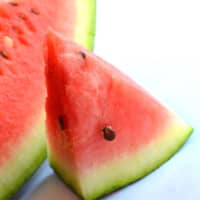Watermelon (Citrullus lanatus) is a flowering plant species of the Cucurbitaceae family and the name of its edible fruit. A scrambling and trailing vine-like plant, it is a highly cultivated fruit worldwide, with more than 1,000 varieties.
Watermelon is grown for its large edible fruit, which is a berry with a hard rind and no internal divisions, and is botanically called a pepo. The sweet, juicy flesh is usually deep red to pink, with many black seeds, although seedless varieties exist. The fruit can be eaten raw or pickled, and the rind is edible after cooking. It may also be consumed as a juice or an ingredient in mixed beverages.
Composition
- Watermelon fruit is 91% water, contains 6% sugars, and is low in fat.
- Vitamin C is present in appreciable content at 10% of the Daily Value.
- Watermelon pulp contains carotenoids, including lycopene.
- The amino acid citrulline is produced in watermelon rind.
- The ethanolic seed extract of C. lanatus showed the presence of phytochemicals such as:
- Saponins
- Alkaloids
- Proteins
- Flavonoids
- The seeds are very high in protein.[1]
- The seeds consist of several amino acids such as:
- Lysine
- Arginine
- Tryptophan
- The seeds contain:
- Vitamin B
- Minerals
- Fats
- Dried watermelon seeds contain 30.6 g of protein, 3.8 g of B vitamins and 556 mg of magnesium and 51 g of fats.[1:1]
- The seeds are a good source of protein, tannin and minerals.
- The seeds contain significant amount of:
- Vitamin c
- Minerals
- Starch
- Fat
- Riboflavin
Healing Properties
Anti-inflammatory
Antioxidant
Antimicrobial
- Microbial assays conducted on the seed extract of C. lanatus showed good signs of inhibition against microorganisms by forming a zone of inhibition.[1:2]
Anticancer
Anti-proliferative
- C. lanatus seeds naturally contain antioxidants and phytochemicals that prevent cancer cell proliferation.[1:3]
Apoptosis
- Ethanolic seed extract of C. lanatus demonstrated significant induced cell cycle arrest and apoptosis at the G2 phase by inhibiting the A549 cell line proliferation.[1:4]
Anti-Diabetic
- The seeds of watermelon have anti-diabetic properties.[1:5]
Diuretic
- The seeds of watermelon contain diuretic properties.[1:6]
Liver Health
- The seeds of watermelon help with liver disorder.[1:7]
Mucoprotective agent
- The seeds of watermelon have demulcent properties.[1:8]
Anti-Parasitic
- The seeds of watermelon have anti-helminthic actions.[1:9]
- The seeds of watermelon is a vermifuge.[1:10] -An agent that destroys or expels parasitic worms.
Kidney Health
- The seeds of watermelon help with chronic renal failure.[1:11]
Lymphatic Health
- The seeds of watermelon help with lymphatic swelling.[1:12]
Skin Health
- Tar is extracted from the seeds and is used for the treatment of scabs and skin tanning.[1:13]
Disease / Symptom Treatment
Cancer
Lung Cancer
- The ethanolic seed extract of C. lanatus has shown good anticancer potential against A549 cells (lung carcinoma epithelial cells).[1:14]
Sciatica
- The seeds of watermelon help with sciatica pain caused by injury to or pressure on the sciatic nerve.[1:15]
Tuberculosis
- The seeds are used to treat tuberculosis, due to its high level of potassium.[1:16]
Title: Apoptosis inducing anti-proliferative activity of Citrullus lanatus seeds against A549 cell lines
Publication: South African Journal of Botany
Date: August 2024
Author(s): V. Ajith Kumar, V. Priscilla Pushparani, G. Baskar, S.M. Kathija Beevi, T.P. Rajarajan, S. Subashini
Institution(s): St. Peter’s College of Engineering and Technology, Chennai, India; St. Joesph’s College of Engineering, Chennai, India; Lebanese American University, Byblos, Lebanon; Chennai Research Foundation, Chennai, India; Saveetha University, Chennai, India
Copy: archive
Title:
Publication:
Date:
Author(s):
Institution(s):
Copy: archive
